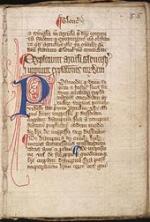(17) Ordinary lawsuits shall not follow the royal court around, but shall be held in a fixed place.
(18) Inquests of novel disseisin, mort d’ancestor, and darrein presentment shall be taken only in their proper county court. We ourselves, or in our absence abroad our chief justice, will send two justices to each county four times a year, and these justices, with four knights of the county elected by the county itself, shall hold the assizes in the county court, on the day and in the place where the court meets.
(19) If any assizes cannot be taken on the day of the county court, as many knights and freeholders shall afterwards remain behind, of those who have attended the court, as will suffice for the administration of justice, having regard to the volume of business to be done.
(20) For a trivial offence, a free man shall be fined only in proportion to the degree of his offence, and for a serious offence correspondingly, but not so heavily as to deprive him of his livelihood. In the same way, a merchant shall be spared his merchandise, and a husbandman the implements of his husbandry, if they fall upon the mercy of a royal court. None of these fines shall be imposed except by the assessment on oath of reputable men of the neighbourhood.
(21) Earls and barons shall be fined only by their equals, and in proportion to the gravity of their offence.
(22) A fine imposed upon the lay property of a clerk in holy orders shall be assessed upon the same principles, without reference to the value of his ecclesiastical benefice.
(23) No town or person shall be forced to build bridges over rivers except those with an ancient obligation to do so.
(24) No sheriff, constable, coroners, or other royal officials are to hold lawsuits that should be held by the royal justices.
(25) Every county, hundred, wapentake, and tithing shall remain at its ancient rent, without increase, except the royal demesne manors.
(26) If at the death of a man who holds a lay `fee’ of the Crown, a sheriff or royal official produces royal letters patent of summons for a debt due to the Crown, it shall be lawful for them to seize and list movable goods found in the lay `fee’ of the dead man to the value of the debt, as assessed by worthy men. Nothing shall be removed until the whole debt is paid, when the residue shall be given over to the executors to carry out the dead man’s will. If no debt is due to the Crown, all the movable goods shall be regarded as the property of the dead man, except the reasonable shares of his wife and children.
(27) If a free man dies intestate, his movable goods are to be distributed by his next-of-kin and friends, under the supervision of the Church. The rights of his debtors are to be preserved.
(28) No constable or other royal official shall take corn or other movable goods from any man without immediate payment, unless the seller voluntarily offers postponement of this.




